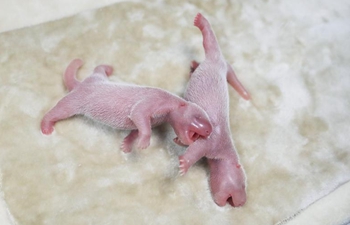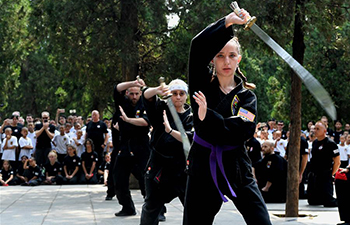WASHINGTON, July 2 (Xinhua) -- American researchers reported in a preclinical models that they can amplify macrophage immune responses against cancer using a self-assembling supramolecule.
A study published on Monday in the journal Nature Biomedical Engineering showed that macrophages, immune cells that engulf and digest particles and pathogens, provided a first line of defense against bacteria and viruses and can also help destroy cancer cells.
Macrophages play a paradoxical role, with M1s anti-tumorigenic, but inflammation-quelling M2s recruited by tumor cells to help them grow, according to the researchers.
Also, tumors can send out "eat me not" signal that tricks M1 macrophages into letting them be, and in this way, pro-tumorigenic macrophages may make up 30 to 50 percent of a tumor's mass.
Investigators have developed a therapeutic that delivers double attack to knock out these mechanisms.
They re-programed the M2s into M1s by inhibiting the M2 signaling pathway, re-educating the macrophages and inhibiting the "don't eat me" protein.
To address both the M2 "re-education" problem and to enhance the macrophages' capacity to eat tumor cells, the researchers used what they call a bi-functional or "one-two punch."
They used a multi-component supramolecular system that self-organizes at the nanoscale to deliver an antibody inhibitor plus a drug inside the tumor.
"This is the first time anyone has combined these two, a drug that targets M2 macrophages and an antibody that inhibits 'don't eat me signal,' in one delivery system," said Ashish Kulkarni at Department of Chemical Engineering of the University of Massachusetts Amherst.
"We tested it in melanoma and breast cancer preclinical models, two aggressive cancers, and we plan to try it on different types of cancer and in combination with other current therapies like T-cell-based therapies now used in clinics," said Kulkarni.
Mice that were untreated formed large tumors by Day 10, mice treated with currently available therapies showed decreased tumor growth, but mice treated with the new supramolecular therapy had complete inhibition of tumor growth, the reported.
The team also reported an increase in survival and a significant reduction in metastatic nodes.
The paper's co-author Shiladitya Sengupta at Brigham and Women's Hospital said, "We can actually see macrophages eating cancer cells," citing confocal microscopy images in the paper that show macrophages engulfing cancer cells.
Kulkarni said next steps are to continue testing the new therapy in preclinical models to evaluate safety, efficacy and dosage.
The supramolecular therapy they have designed has been licensed and they hope to move the therapeutic into clinical trials if preclinical testing continue to show promise.















